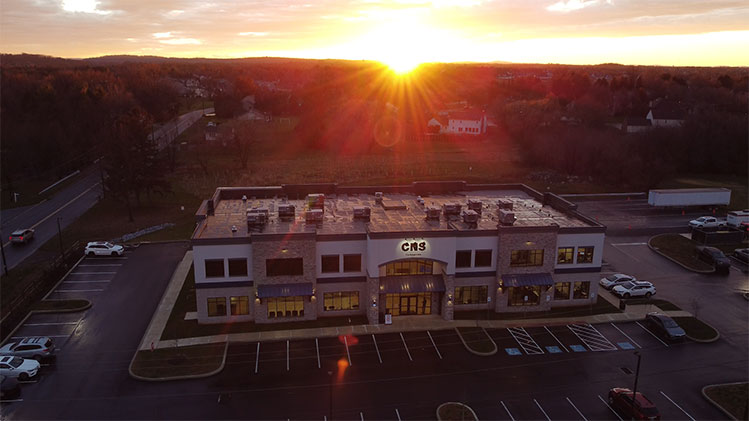Furry Friends Cause Trucking Border Delays At Canadian Border
To prevent reintroduction of rabies carried by dogs into the United States, new CDC regulations require proof of healthy pets at border crossing. Truckers who
We are a team of DOT Compliance and Licensing Professionals helping trucking and transportation companies remain safe, compliant, and profitable.
CNS or Compliance Navigation Specialists is DOT Compliance company that assists trucking and transportation companies remain DOT Compliant. We are part of a network of companies, CNS Companies, specializing in services related to the transportation, manufacturing, construction, service, education and medical industries.

A full-scale DOT Compliance Program managing a long haul carrier’s safety, compliance, licensing and more.
Learn more >>>
A DOT Compliance Program that keeps motor carriers compliant with the 6 Basic DOT Regulations required of all carriers.
Learn more >>>
Our Short-Haul/Construction Program is a full-scale program designed for private carriers that do not haul for-hire.
Learn more >>>
Our most comprehensive DOT Compliance Program, operating as your company’s off-site Safety Director or assisting your current safety personnel.
Learn more >>>
Our Non-CDL Program is a full-scale program managing safety, compliance, licensing and more for moving companies, couriers, landscapers, or any company subject to DOT regulations and does not employ CDL drivers.
Learn more >>>
Our DOT Audit Services cover a number of different types of DOT Audits that new and existing carriers will be subject to.
Our DOT Driver Services help trucking companies and carriers to stay compliant as they grow and hire more drivers.
Our DOT Vehicle Services focus on ensuring your vehicles are compliant with DOT Regulations, which is just as important as your drivers.
Our DOT Services for Special Carriers focus on companies outside of the typical motor carrier, like HAZMAT, Passenger and Bus Carriers.
CNS is part of a group of companies that offer other necessary services for the trucking and transportation industry, such as Commercial Trucking Insurance, CDL Training, Online Training Course, and even Healthcare.
Our DOT Licensing Services will cover you whether you are an existing company or just starting a trucking company. Our DOT Licensing Specialists can help you get up and running and in days with your DOT number, MC Authority, EIN, UCR, IFTA, 2290 HVUT, Fuel Taxes and can even set you up to get your Commercial Driver's License (CDL) with CNS Driver Training Center.
Our DOT Licensing Specialists will help you with every aspect of starting a trucking company. All you need to do is choose a name for your trucking company.
You will need to ensure your DOT Number, MC Authority, Vehicle Registration, etc. is all set up properly when you start your trucking business.
Our Licensing Specialists can help with all aspects of filing and renewing licenses, fuel taxes, etc.
CNS is part of a group of companies that offer other necessary services for the trucking and transportation industry, such as Commercial Trucking Insurance, CDL Training, Online Training Course, and even Healthcare.
To prevent reintroduction of rabies carried by dogs into the United States, new CDC regulations require proof of healthy pets at border crossing. Truckers who
CNS or Compliance Navigation Specialists is DOT Compliance company that assists trucking and transportation companies remain DOT Compliant. We are part of a network of companies, CNS Companies, specializing in services related to the transportation, manufacturing, construction, service, education and medical industries.
CNS Companies is a network of companies specializing in services related to the transportation, manufacturing, construction, service, education and medical industries. Our DOT Compliance division is handled by Compliance Navigation Specialists, CNS Insurance handles Commercial Truck Insurance, CDL training is managed by the CNS Driver Training Center and healthcare is managed by CNS Occupational Medicine.
We are a team of DOT Compliance and Licensing Professionals helping trucking and transportation companies remain safe, compliant, and profitable.
CNS or Compliance Navigation Specialists is DOT Compliance company that assists trucking and transportation companies remain DOT Compliant. We are part of a network of companies, CNS Companies, specializing in services related to the transportation, manufacturing, construction, service, education and medical industries.

A full-scale DOT Compliance Program managing a long haul carrier’s safety, compliance, licensing and more.
Learn more >>>
A DOT Compliance Program that keeps motor carriers compliant with the 6 Basic DOT Regulations required of all carriers.
Learn more >>>
Our Short-Haul/Construction Program is a full-scale program designed for private carriers that do not haul for-hire.
Learn more >>>
Our most comprehensive DOT Compliance Program, operating as your company’s off-site Safety Director or assisting your current safety personnel.
Learn more >>>
Our Non-CDL Program is a full-scale program managing safety, compliance, licensing and more for moving companies, couriers, landscapers, or any company subject to DOT regulations and does not employ CDL drivers.
Learn more >>>
Our DOT Audit Services cover a number of different types of DOT Audits that new and existing carriers will be subject to.
Our DOT Driver Services help trucking companies and carriers to stay compliant as they grow and hire more drivers.
Our DOT Vehicle Services focus on ensuring your vehicles are compliant with DOT Regulations, which is just as important as your drivers.
Our DOT Services for Special Carriers focus on companies outside of the typical motor carrier, like HAZMAT, Passenger and Bus Carriers.
CNS is part of a group of companies that offer other necessary services for the trucking and transportation industry, such as Commercial Trucking Insurance, CDL Training, Online Training Course, and even Healthcare.
Our DOT Licensing Services will cover you whether you are an existing company or just starting a trucking company. Our DOT Licensing Specialists can help you get up and running and in days with your DOT number, MC Authority, EIN, UCR, IFTA, 2290 HVUT, Fuel Taxes and can even set you up to get your Commercial Driver's License (CDL) with CNS Driver Training Center.
Our DOT Licensing Specialists will help you with every aspect of starting a trucking company. All you need to do is choose a name for your trucking company.
You will need to ensure your DOT Number, MC Authority, Vehicle Registration, etc. is all set up properly when you start your trucking business.
Our Licensing Specialists can help with all aspects of filing and renewing licenses, fuel taxes, etc.
CNS is part of a group of companies that offer other necessary services for the trucking and transportation industry, such as Commercial Trucking Insurance, CDL Training, Online Training Course, and even Healthcare.
To prevent reintroduction of rabies carried by dogs into the United States, new CDC regulations require proof of healthy pets at border crossing. Truckers who
CNS or Compliance Navigation Specialists is DOT Compliance company that assists trucking and transportation companies remain DOT Compliant. We are part of a network of companies, CNS Companies, specializing in services related to the transportation, manufacturing, construction, service, education and medical industries.
CNS Companies is a network of companies specializing in services related to the transportation, manufacturing, construction, service, education and medical industries. Our DOT Compliance division is handled by Compliance Navigation Specialists, CNS Insurance handles Commercial Truck Insurance, CDL training is managed by the CNS Driver Training Center and healthcare is managed by CNS Occupational Medicine.
In 2015, the American Trucking Association estimated that 890,000 new commercial truck drivers would be needed by 2025 to meet the rising freight demands. Currently, based on data by the Bureau of Labor Statistics, “Baby Boomers” (ages 45-65) compose 49.4% of the drivers on the road, while “Millennials” (ages 21-34) make up less than 16%.
Why the shortage? What is inhibiting Millennials from pursuing a career on the road?
Several reasons are speculated by transportation industry professionals:
– An increase in load rates is needed to keep pace with the cost of living, or restructuring of way drivers are compensated. For Example, changing pay structures to hourly wages rather than a rate per mile.
– CDL holders must be 21 year of age or older for interstate travel. The increasing trend of post-high school young adults taking a “gap year” or two years before pursuing college or secondary education has allowed the transportation industry an opportunity that is squandered by federal regulation on interstate travel.
– Young drivers (under age 25) are costly to insure for trucking companies, and not desirable candidates for employment because of the financial burden they present.
And lastly:-
– Millennials do not view life on the road as attractive, exciting, or glamorous. Long haul opportunities are viewed as isolating and restrictive. Many are also unfamiliar with the complex regulations imposed by the FMCSA, and inexperienced with balancing communication between job requirements, company dispatchers, safety managers, and customers.
How can trucking companies better accommodate the needs of Millennials in the workplace, or on the road? Aside from the suggestion of pay increase or restructure, the impression of the isolated trucker must be addressed and reformed.
Like any industry, training is vital to a secure and enjoyable career. Although drivers are given adequate training on physically driving and maneuvering a truck, filling out a log book or operating e-log system, and communicating with a dispatcher.
A suggestion by our own president and CEO at Compliance Navigation Specialists is simply- “Mentorship”. At CNS, our consultants can guide you through the complex federal regulations and set you up for success in the trucking industry as an owner operator. However, the solitude of the road can be daunting. Having someone to talk to can make a big difference in your success.
“Mentorship programs at larger carriers, Swift for example, have proven effective at forging a relationship between an inexperienced driver and a veteran driver. In addition to knowledge gained by the inexperienced driver with a new CDL, it furthers the sense of community within the trucking industry.”
“A growing presence of young or inexperienced drivers, as well as driver’s spouses or families on social media proves that a sense of community is desired. It is time that companies follow suit to fulfill the benefit of inter-generational mentorships.”

truckers distribute vaccine and protect from robberies

Pennsylvania passed a bill last month requiring stricter non-parking incident reporting requirements on holders of commercial driver licenses (CDL) driving a commercial motor vehicle. There
The Commercial Vehicle Safety Alliance (CVSA) wants more time to collect and analyze comments on the FMCSA’s proposal for changes to the hours-of-service rules. The
Frequently asked questions about the safety rating upgrade process at CNS! Chris, our VP of Business Development, interviews Hoyt Craver, our Safety Rating Upgrade Project
Our DOT Compliance Programs ensure it is your top priority and keeps your business running.
Receive the latest transportation and trucking industry information about FMCSA and DOT Audits, Regulations, etc.

truckers distribute vaccine and protect from robberies

Pennsylvania passed a bill last month requiring stricter non-parking incident reporting requirements on holders of commercial driver licenses (CDL) driving a commercial motor vehicle. There
The Commercial Vehicle Safety Alliance (CVSA) wants more time to collect and analyze comments on the FMCSA’s proposal for changes to the hours-of-service rules. The
Join our monthly newsletter and stay up-to-date on trucking industry news and receive important compliance and licensing tips.
Join our monthly newsletter and stay up-to-date on trucking industry news and receive important compliance and licensing tips.